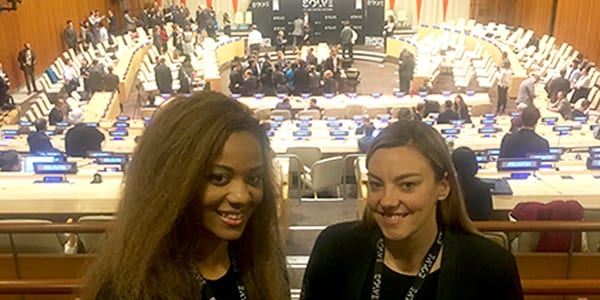 Last month, I found myself preparing to present at the United Nations alongside a group of top social impact entrepreneurs. We were all finalists in a global competition by the Massachusetts Institute of Technology (MIT) non-profit SOLVE, which focuses on “solving the world’s most pressing challenges through open innovation and partnership.” Many of the finalists had businesses and start-ups that were years in the making, and were regarded as leaders in their respective fields of refugee education, carbon emissions and chronic diseases.
Last month, I found myself preparing to present at the United Nations alongside a group of top social impact entrepreneurs. We were all finalists in a global competition by the Massachusetts Institute of Technology (MIT) non-profit SOLVE, which focuses on “solving the world’s most pressing challenges through open innovation and partnership.” Many of the finalists had businesses and start-ups that were years in the making, and were regarded as leaders in their respective fields of refugee education, carbon emissions and chronic diseases.
My colleague Anne Marie Kearns and I came up with an innovative cancer literacy approach that leveraged artificial intelligence to help address cancer burden in developing countries. I truly believe in the idea. It could potentially impact lives and, suddenly, it all felt real once I took to the stage.
While we didn’t take home a “grand prize,” I brought back a wealth of experiences and I’m proud to say the SOLVE I presented is still in development. Here are my key takeaways from this experience that I hope serve as necessary reminders for us all.
Spend the time to learn from your successes.
As I listened to the impressive SOLVES, I was struck by how often presenters dissected their successes along the way. Yes, there were stories of critical failures that reshaped business goals, however one question was always asked: Why did this work? We’ve all been trained to deconstruct failures for learnings, but when was the last time you did the same thing for a project you won or initiative that was a massive success? I was reminded that the lessons from our successes are as invaluable as the ones from our failures.
Take criticism, especially when you least want to hear it.
Being professional and solution-oriented about constructive criticism is not always easy. It is even harder to make the most of potentially stellar advice when you simply will not hear it. Perhaps you’re convinced the timing was not right (your project just failed/succeeded), or in the moment, you disagreed with the feedback. While we can control how and when we give feedback to others, we cannot always control how and when we receive it.
Moments after I finished my presentation and my colleagues shared their congratulations, someone approached me with suggestions on “how it could have been better.” At the time, it was not what I wanted to hear, but I scribbled it down on the back of one of my own business cards. I said thank you and walked away. Later that week I read the scribble – the advice was spot on.
Make meaningful connections, not a business-card pile.
At the end of a very long day, all the finalists were invited to a networking mixer with other entrepreneurs, innovators, experts and potential funders. It was refreshing to hear conversations open with, “I heard you are trying to solve for X problem. I would like to learn more and, if a fit, I can introduce you to this expert,” or, “My team and I are working on X. Tell me more about your project; perhaps we can help each other.” Many of us attend a ton of networking events and may find ourselves on auto-pilot exchanging business cards. This was a good reminder that building a real, valuable network is also about making connections in the moment. Don’t miss out on an opportunity to have a meaningful conversation by simply swapping business cards and saying you will follow up.
Being a good presenter matters, but don’t underestimate the power of simple communication.
We all presented in the Economic and Social Council Chamber of the United Nations against an aggressive countdown clock while being live-streamed for the world to see. Nothing about that was easy. Some presenters were charismatic, drew you in from the start and commanded the stage. However, not all of the top winners were at-ease communicators. Some people were visibly nervous and came across a little less engaging. But armed with a truly brilliant SOLVE, they presented the problem, noted how their solution worked and why it would work. Not everyone can charm a crowd, or be the most engaging presenter, but there is incredible value in being able to communicate simply: this is the problem, here is my solution and this is why it matters.
One day you’ll have an idea that is so good it makes you uncomfortable – pursue it.
Whether it is finally raising your hand to share that awesome project idea with your colleagues/boss/entire company not knowing how they will react, or making the idea you work on at midnight, holidays and weekends a reality – try it! And, perhaps more importantly, be the person who encourages and contributes to an environment that embraces that openness for others.
My top takeaway from this experience is that fostering creativity and entrepreneurialism can have a profoundly positive impact on our world.